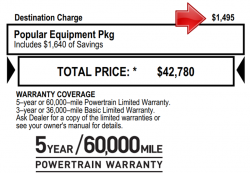
— A Chrysler "destination charge" lawsuit alleges the automaker charges too much to deliver vehicles to dealerships when consumers purchase or lease new vehicles. The class action lawsuit alleges Chrysler (Stellantis) makes a profit from the $1,495 destination charge that appears on the window sticker.
The two customers who filed the lawsuit claim they shouldn't have been forced to pay the destination fee which Chrysler charges to dealerships for each new vehicle.
The Chrysler class action lawsuit over destination charges includes all New Jersey and New York consumers who, during the applicable statute of limitations, paid a destination charge.
According to the plaintiffs, the $1,495 Chrysler destination charge is not a legitimate charge related to the cost for delivering a vehicle.
The class action was filed after Consumer Reports said in February that automakers have increased destination fees from an average of $840 in 2011 to $1,240 in 2020.
While Chrysler charges a $1,495 destination charge, Consumer Reports found Ford charges $1,495 for the Ford Bronco and Ford Bronco Sport, and the 2021 Ford F-150 has a destination fee of $1,695.
The class action says the Automobile Information Disclosure Act requires automakers to disclose on the new vehicle window sticker “the amount charged to the dealer for the transportation of the car to the place of delivery.”
According to plaintiffs Cregory Cole (New York) and Kimberly Enright (New Jersey), they were deceived because they didn't know Chrysler made a profit from the $1,495 destination charge.
And they both claim they wouldn't have purchased their vehicles, or would have paid less for the vehicles, if they would have known Chrysler made a profit. The plaintiffs don't say how much less they would have paid if Chrysler would have admitted it made a profit from the delivery fees.
The plaintiffs allege consumers are deceived regarding the cost of shipping the vehicles to dealerships because the automaker adds a "deceptively-named 'Destination Charge' to each of their automobile sales."
"By virtue of the name of the fee itself, Defendants mislead reasonable consumers into believing its “Destination Charge” reflects the actual cost of shipping vehicles to their “destination,” not the cost of shipping the vehicle plus profit." — Chrysler class action lawsuit
The Chrysler class action lawsuit also says consumers cannot negotiate the destination charge, a fee that allegedly includes a "significant amount of profit." This allegedly deceives consumers into paying for more than the cost of the vehicle delivery to a dealer.
"Defendants’ price stickers break out the Destination Charge separate and apart from the base MSRP and include it as an add-on. With this chicanery, the vehicle itself appears less expensive, and Defendants’ artificial 'Destination Charge' can be used as a vessel for profit that would otherwise appear in the cost of the vehicle." — Chrysler class action lawsuit
The Chrysler destination charge class action lawsuit was filed in the U.S. District Court for the Eastern District of New York: Cole, et al., v. FCA US LLC, et al.
The plaintiffs are represented by Kopelowitz Ostrow Ferguson Weiselberg Gilbert, and Kaliel Gold PLLC.




